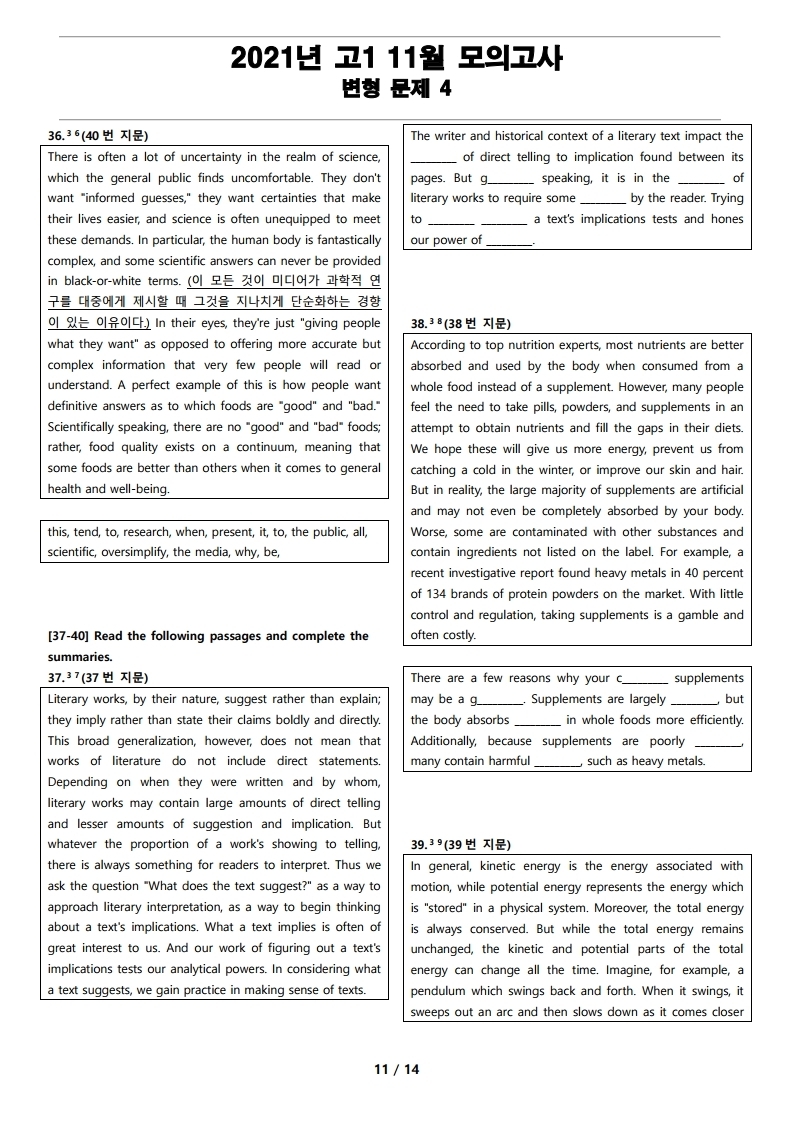2021년 고1 11월 전국 연합 모의고사
(경기도교육청)
변형 문제 4
2021년 고1 11월 전국 연합 모의고사(경기도교육청) 변형 문제 4
일반 워크북 형태의 문제에서 벗어나 The Makings가 만든
2021년 고1 11월 전국 연합 모의고사 변형 문제 4
출판사에서 오랫동안 영어 번역과 교정을 하셨던 원어민 선생님과
현직에서 강사를 하고 있는 연구진들이 학생들을 위한 최상의
2021년 고1 11월 전국 연합 모의고사 변형 문제 4 을 선보입니다.
사고력과 이해력을 요구하는 문제들로 내신 대비 뿐만이 아니라
수능도 한꺼번에 공부하실 수 있는 자료입니다.
중간고사&기말고사 전에 더메이킹스(The Makings)에서 제작한
2021년 고1 11월 전국 연합 모의고사 변형 문제로 마무리 하세요.
정답 확인하러가기!
2021년 고1 11월 전국 연합 모의고사 변형 문제 4(경기도교육청)
2021년 고1 11월 전국 연합 모의고사 변형 문제, 내신대비, 영어내신자료,고등영어자료, 모의고사 변형문제,전국 연합모의고사 변형자료, 모의고사 영어 서술형 대비, 대치동 고등 영어자료, 대치
themakings.co.kr
themakings.co.kr
1. 빈칸 채우기(객관식)
2. 글의 내용 일치/불일치(객관식/한글 선택지)
3. 글의 내용 일치/불일치(객관식/영어 선택지)
4. 글 끼어 넣기(객관식)
5. 어법(서술형)
6. 어휘(서술형)
7. 주제문(객관식/영어 선택지)
8. 어휘 빈칸 채우기(서술형)
9. 영작(서술형)
10. 요약문 완성하기(서술형)
11. 문단 재배열 하기(객관식)
더메이킹스(The Makings)가 제작한 2021년 고1 11월 전국 연합 모의고사 변형 문제 4의 지문입니다.
1번 지문(문항 번호 37번)
Literary works, by their nature, suggest rather than explain; they imply rather than state their claims boldly and directly. This broad generalization, however, does not mean that works of literature do not include direct statements. Depending on when they were written and by whom, literary works may contain large amounts of direct telling and lesser amounts of suggestion and implication. But whatever the proportion of a work's showing to telling, there is always something for readers to interpret. Thus we ask the question "What does the text suggest?" as a way to approach literary interpretation, as a way to begin thinking about a text's implications. What a text implies is often of great interest to us. And our work of figuring out a text's implications tests our analytical powers. In considering what a text suggests, we gain practice in making sense of texts.
2번 지문(문항 번호 38번)
According to top nutrition experts, most nutrients are better absorbed and used by the body when consumed from a whole food instead of a supplement. However, many people feel the need to take pills, powders, and supplements in an attempt to obtain nutrients and fill the gaps in their diets. We hope these will give us more energy, prevent us from catching a cold in the winter, or improve our skin and hair. But in reality, the large majority of supplements are artificial and may not even be completely absorbed by your body. Worse, some are contaminated with other substances and contain ingredients not listed on the label. For example, a recent investigative report found heavy metals in 40 percent of 134 brands of protein powders on the market. With little control and regulation, taking supplements is a gamble and often costly.
3번 지문(문항 번호 39번)
In general, kinetic energy is the energy associated with motion, while potential energy represents the energy which is "stored" in a physical system. Moreover, the total energy is always conserved. But while the total energy remains unchanged, the kinetic and potential parts of the total energy can change all the time. Imagine, for example, a pendulum which swings back and forth. When it swings, it sweeps out an arc and then slows down as it comes closer to its highest point, where the pendulum does not move at all. So at this point, the energy is completely given in terms of potential energy. But after this brief moment of rest, the pendulum swings back again and therefore part of the total energy is then given in the form of kinetic energy. So as the pendulum swings, kinetic and potential energy constantly change into each other.
4번 지문(문항 번호 40번)
There is often a lot of uncertainty in the realm of science, which the general public finds uncomfortable. They don't want "informed guesses," they want certainties that make their lives easier, and science is often unequipped to meet these demands. In particular, the human body is fantastically complex, and some scientific answers can never be provided in black-or-white terms. All this is why the media tends to oversimplify scientific research when presenting it to the public. In their eyes, they're just "giving people what they want" as opposed to offering more accurate but complex information that very few people will read or understand. A perfect example of this is how people want definitive answers as to which foods are "good" and "bad." Scientifically speaking, there are no "good" and "bad" foods; rather, food quality exists on a continuum, meaning that some foods are better than others when it comes to general health and well-being.
'전국 연합 모의고사 변형 문제 > 고1 모의고사 변형 문제' 카테고리의 다른 글
| 2022년 고1 3월 전국 연합 모의고사 변형 문제 2 (0) | 2022.03.31 |
|---|---|
| 2022년 고1 3월 전국 연합 모의고사 변형 문제 1 (0) | 2022.03.29 |
| 2021년 고1 11월 전국 연합 모의고사(경기도교육청)변형 문제 3 (0) | 2021.11.29 |
| 2021년 고1 11월 전국 연합 모의고사(경기도교육청) 변형 문제 2 (0) | 2021.11.29 |
| 2021년 고1 11월 전국 연합 모의고사(경기도교육청)변형 문제 1 (0) | 2021.11.28 |

